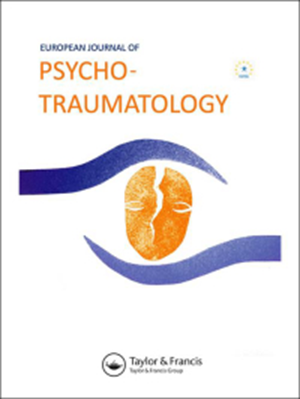对童年受虐待的成年幸存者进行技能培训,然后采用 EMDR 或叙事疗法治疗创伤后应激障碍:随机对照试验
IF 4.2
2区 医学
Q1 PSYCHIATRY
引用次数: 0
摘要
背景:童年受虐后出现创伤后应激障碍的患者在接受心理健康服务的患者中占有很大的比例。分阶段治疗的目的是为患者量身定制治疗方案。本文章由计算机程序翻译,如有差异,请以英文原文为准。
Skills training followed by either EMDR or narrative therapy for posttraumatic stress disorder in adult survivors of childhood abuse: a randomized controlled trial
Background: Individuals suffering from PTSD following childhood abuse represent a large subgroup of patients attending mental health services. The aim of phase-based treatment is to tailor treatmen...
求助全文
通过发布文献求助,成功后即可免费获取论文全文。
去求助
来源期刊

European Journal of Psychotraumatology
Multiple-
CiteScore
7.60
自引率
12.00%
发文量
153
审稿时长
18 weeks
期刊介绍:
The European Journal of Psychotraumatology (EJPT) is a peer-reviewed open access interdisciplinary journal owned by the European Society of Traumatic Stress Studies (ESTSS). The European Journal of Psychotraumatology (EJPT) aims to engage scholars, clinicians and researchers in the vital issues of how to understand, prevent and treat the consequences of stress and trauma, including but not limited to, posttraumatic stress disorder (PTSD), depressive disorders, substance abuse, burnout, and neurobiological or physical consequences, using the latest research or clinical experience in these areas. The journal shares ESTSS’ mission to advance and disseminate scientific knowledge about traumatic stress. Papers may address individual events, repeated or chronic (complex) trauma, large scale disasters, or violence. Being open access, the European Journal of Psychotraumatology is also evidence of ESTSS’ stand on free accessibility of research publications to a wider community via the web. The European Journal of Psychotraumatology seeks to attract contributions from academics and practitioners from diverse professional backgrounds, including, but not restricted to, those in mental health, social sciences, and health and welfare services. Contributions from outside Europe are welcome. The journal welcomes original basic and clinical research articles that consolidate and expand the theoretical and professional basis of the field of traumatic stress; Review articles including meta-analyses; short communications presenting new ideas or early-stage promising research; study protocols that describe proposed or ongoing research; case reports examining a single individual or event in a real‑life context; clinical practice papers sharing experience from the clinic; letters to the Editor debating articles already published in the Journal; inaugural Lectures; conference abstracts and book reviews. Both quantitative and qualitative research is welcome.
 求助内容:
求助内容: 应助结果提醒方式:
应助结果提醒方式:


